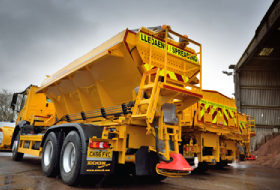Gritting
Page updated on: 05/02/2025
Every year we spend around £1 million on the winter maintenance of our county roads. The roads are salted in advance when there is a risk of ice, and during severe weather, cleared of snow so far as is possible. The aim is to reduce the risk to motorists in what can sometimes be appalling conditions. Approximately 25% of Carmarthenshire roads (Country and Trunk) are treated as a priority when weather conditions demand it.
We have a fleet of 19 gritter lorries with highly trained drivers which will treat around 21% of the 3,526 kilometres of country roads when necessary. We have approximately 12,200 tonnes of salt in stock, most of which are stored under cover in Salt Barns in strategic locations across the county.
Our staff are on standby 24 hours a day, seven days a week, 365 days a year to respond to the changing weather and road conditions. Around 920 kilometres of roads across Carmarthenshire can be treated within four hours of a bad weather warning, with up to 120T applied in each application.
From the 1st October to the 30th April each year, the County Council subscribes to a specialist roads weather forecasting service. Forecasts are provided on an individual route by route basis allowing Duty Officers to access up to date routebased forecasts and detailed weather information via a web-based management system.
The County Council works closely with the South Wales Trunk Road Agency and the Western Area Partnership (WAP) to treat the Trunk Roads within Carmarthenshire. Forecasting and decision making for winter treatment of Trunk Roads is undertaken by SWTRA with the Highways and Transportation team then undertaking treatment of the Trunk Road Network within specified timeframes.
The first priority is given to trunk and principal routes: this includes roads leading to hospitals, ambulance stations, fire stations, railway stations, regular bus routes, strategic commuter routes, slip roads, and other important distributor routes.
In extreme conditions, secondary priority is given to other commuter routes, shopping streets, historically problematic sections (not on the first priority routes) and other bus routes.
We currently have 1,100 grit bins across the county. Additional grit bins can be requested but an assessment of risk and need will be undertaken to determine requirements. We also liaise with town and community councils and residents’ associations to review the locations of grit bins. We inspect and fill all our grit bins in the autumn. If there is snow, the bins will only be re-filled if staff and equipment become available to undertake the work.
The salt should be used very sparingly, as it does not aid grip but is supplied to assist in preventing the formation of ice and melting of snow. It is provided for use only on public roads and pavements and should not be used or transported anywhere else. We refill grit bins when required and following requests provided resources are available.
We don’t routinely salt footpaths or pavements. We have to prioritise major roads rather than pavements to prevent the most serious accidents. Hand salting of pavements will only be carried out if staff and equipment become available, with pavements in main shopping areas and busy urban areas treated as a priority. We encourage householders and businesses to help themselves by clearing snow and ice from public areas near their properties.
There is no statutory requirement to grit car parks and there are a number of local authorities in Wales who do not, or have ceased to grit car parks. The level of resource available to deliver services has reduced each year since 2008. Given the resource constraints, the County Council has had to rationalise service provision and consequently agreed budget savings in 2020/21 to amend our winter gritting routes to exclude Car Parks except those that include medical facilities.
Our gritters follow a detailed route, so that they can grit the primary roads within a specific area. When designing this detailed route we take into account the length of road that the gritter can treat when it has been fully loaded with salt.
To maximise efficiency and reduce the time taken to salt the roads, the gritter has to travel across some intersecting roads to be able to salt the primary roads. It is not feasible to salt these intersecting roads as the gritter would not have sufficient salt to treat the primary roads.
The gritter may be empty and returning to the depot after completing its run.
When the gritter lorry is using its snow ploughs, salt is not always applied.
It would be impossible to grit every street in the county. Trunk and principal routes are given priority; this includes roads leading to hospitals, ambulance stations, fire stations, railway stations, important bus routes, slip roads, and historically problematic sections.
In extreme conditions, secondary priority is given to shopping streets, historically problematic sections (not on the first priority routes) and other bus routes.
We are sure residents understand that the most important thing when supplies are under pressure is to keep the main roads clear in the interests of emergency services, bus services, continuity of food and fuel supplies and to minimise the risk of accidents.
We also respond to emergencies and we will tackle side roads when prevailing weather conditions and salt supplies permit.
We are supplied by Compass Minerals, a company based in Cheshire, which supplies numerous local authorities in Wales and the UK as a whole. We work regionally in collaboration with Welsh Government and other local authorities to maintain supplies.
There is 24-hour availability, seven days a week. Gritting teams go out at times that are dependent on the weather including late night and during the early hours of the morning. We grit around 920 kilometres in one shift, that’s 25 per cent of the road network in Carmarthenshire (including Trunk roads).
Yes, we have a well developed Adverse Weather and Winter Service Plan which identifies priorities and how they are dealt with. At the start of every winter we are fully stocked with supplies and we top them up when required.
We have approximately 12,200 tonnes of salt in stock at the start of the season, most of which is stored under cover in salt barns. Although that sounds like a lot, we can use up to 1,000 tonnes a day with continuous gritting during severe ice and snow. We can never say that we will have enough salt because we do not know what the winter will bring, however, we are very well prepared with the recommended resilience levels met.
Carmarthenshire is part of the Wales salt cell which determines deliveries to local authorities on a needs basis during difficult times.
We continuously receive weather forecast information from Metdesk UK and gritting actions are carried out if poor road conditions are predicted. We are also able to monitor data obtainable from weather outstations that have been installed on trunk and principal roads in the West Wales region.
Please note NOT ALL roads in the county are gritted. If snow should fall, snow clearing work will come into operation across the whole county on a priority basis.




